#pos point of sale systems
Text
Navigating Success: Unveiling the Top POS Systems Shaping Modern Business
In the fast-paced world of commerce, the right Point of Sale (POS) system can make all the difference, transforming transactions into opportunities for efficiency, customer satisfaction, and business growth. Let's explore the top POS systems that are reshaping the landscape of modern business, offering unparalleled features and benefits.
1. Square: The Versatile Powerhouse
Square has earned its place as a versatile POS system, catering to businesses of all sizes. Its user-friendly interface and integrated payment processing simplify transactions, while features like inventory management and analytics provide valuable insights. Square's adaptability and affordability make it a go-to choice for startups and established enterprises alike.
2. Shopify POS: Unifying Online and In-Store Operations
Shopify POS seamlessly bridges the gap between online and brick-and-mortar operations, offering a unified platform for businesses with both facets. This integration ensures consistency in inventory management, customer data, and sales tracking. With a focus on user experience and comprehensive features, Shopify POS empowers businesses to thrive in an omnichannel retail environment.
3. Lightspeed: Tailored for Retail Excellence
Lightspeed is a comprehensive POS system designed to optimize retail operations. Its cloud-based architecture ensures accessibility from anywhere, and features such as inventory management, CRM, and detailed reporting make it a powerhouse for retailers. Lightspeed's scalability caters to the evolving needs of businesses, from small boutiques to larger enterprises.
4. Clover: Customization and Scalability
Clover stands out for its customization options and scalability. The sleek hardware and intuitive software provide businesses with the flexibility to tailor their POS experience. The Clover app marketplace further expands functionality, allowing businesses to integrate additional features and third-party applications as needed.
5. Vend: Cloud-Based Retail Management
Vend takes retail management to the cloud, offering a streamlined and accessible solution for businesses. Its user-friendly interface simplifies transactions, while real-time inventory tracking ensures accurate stock management. With detailed reporting tools, Vend empowers retailers to make data-driven decisions, driving business growth in a competitive market.
6. Toast: Revolutionizing Dining Experiences
Toast is a POS system tailored for the restaurant and hospitality industry. Its features go beyond basic transaction processing, encompassing order management, kitchen operations, and customer interactions. Toast's intuitive design ensures seamless operations in the fast-paced world of dining, making it a preferred choice for restaurateurs seeking efficiency and control.
7. Revel Systems: Enterprise-Grade Efficiency
Revel Systems caters to the needs of larger enterprises with its enterprise-grade POS solution. In addition to standard transaction processing, Revel offers advanced features like employee management, loyalty programs, and extensive integrations. This makes Revel a robust choice for businesses with complex operational requirements and a focus on scalability.
8. Square for Restaurants: Enhancing the Dining Experience
Square extends its prowess to the restaurant industry with Square for Restaurants. This POS system is tailored to meet the unique needs of dining establishments, offering features such as table management, menu customization, and order modifiers. Seamless integration with Square's ecosystem provides a holistic solution for efficient restaurant operations.
9. ShopKeep: Intuitive and Rapid Deployment
ShopKeep prides itself on its intuitive design, making it an ideal solution for businesses looking for a quick and hassle-free setup. This iPad-based POS system is particularly well-suited for small and medium-sized enterprises. With features like inventory tracking, employee management, and detailed sales reporting, ShopKeep empowers businesses to efficiently manage their daily operations.
10. Erply: Global Cloud-Based Operations
Erply is a cloud-based POS system with a global reach, making it suitable for businesses with international operations. Its centralized management system provides real-time oversight of multiple locations, ensuring consistency in operations. Erply also offers comprehensive reporting tools, inventory management, and e-commerce integration, making it a unified solution for global businesses.
Choosing the Right POS System: A Strategic Decision
Selecting the top POS system for your business is not just about transaction processing; it's a strategic decision that impacts overall efficiency, customer satisfaction, and growth potential. The right POS system streamlines operations, provides actionable insights, and adapts to the evolving needs of your business.
As technology continues to advance, the top POS systems will likely evolve to incorporate even more innovative features, further transforming the way businesses conduct transactions. Embrace the power of these systems, and embark on a journey of enhanced efficiency, improved customer experiences, and sustained success in the competitive landscape of modern business.
0 notes
Text
Taking Stock: The Essentials of Restaurant Inventory Management Software

In the realm of gastronomy, where patrons demand nothing less than top-tier cuisine and impeccable service, restaurant proprietors and administrators face the arduous task of maintaining a well-stocked kitchen, minimizing wastefulness, and effectively managing expenditures. This is precisely where the realm of restaurant inventory management software comes into play. In this extensive discourse, we embark on a profound exploration of the fundamentals surrounding restaurant inventory management software, accentuating its merits, pivotal attributes, and the transformative potential it harbors for restaurant operations.
What Constitutes Restaurant Inventory Management Software?
Restaurant inventory management software stands as a formidable tool meticulously engineered to empower restaurant proprietors and supervisors in their relentless pursuit of methodically overseeing, tracking, and mastering their inventory infrastructure. It proffers a digital remedy to the timeless quandaries tied to the meticulous surveillance of ingredients, provisions, and equipment. This software forms the bedrock of a meticulously organized culinary haven, perpetually ensuring the harmonious rhythm of all operations.
The Merits of Adhering to Inventory Management Software
Meticulous Expenditure Oversight
Amongst the most noteworthy advantages attributed to restaurant inventory management software is its capacity to exercise judicious expenditure control. Through precise monitoring of inventory levels and the vigilant observation of consumption patterns, avenues for curbing extravagance and trimming expenses are unveiled. The ramifications of this could be profound, bearing the potential to elevate profitability to unprecedented heights.
Augmented Precision
Manual inventory management bears the inherent vulnerability of yielding inaccuracies, a potential source of stock-related discrepancies. The advent of inventory management software dispels this risk through the mechanization of the entire process. It endows you with real-time data, perpetually ensuring the pristine precision of your inventory records.
Amplified Efficiency
Efficiency is the quintessential cornerstone upon which any prosperous restaurant establishment is erected. Inventory management software expedites the ordering procedures by triggering alerts when inventory dwindles perilously low. This precludes the peril of overstocking or the harrowing scenario of crucial ingredients vanishing from your inventory, safeguarding the seamless operation of your kitchen.
The Pivotal Attributes of Restaurant Inventory Management Software
To surge past competitors within the fiercely competitive restaurant landscape, a keen comprehension of the cardinal attributes rendering inventory management software indispensable is imperative:
Inventory Surveillance - At its core, inventory management software is the sentinel of your inventory realm. It furnishes you with the means to vigilantly monitor the quantity and utilization of each constituent in real time. A mere glance suffices to discern which items teeter on the precipice of depletion, necessitating prompt replenishment.
Astute Supplier Management - Effective supplier management assumes a pivotal role in the flourishing of any dining establishment. Inventory management software empowers you to maintain meticulous records of your suppliers, encompassing their contact details and pricing specifics. Some advanced iterations even facilitate the automation of reordering contingent on predetermined criteria.
Integration with Culinary Repertoire - Seamless integration with your restaurant's menu constitutes a game-changing facet. It ensures that you perpetually possess the necessary ingredients to conjure each culinary masterpiece. Additionally, it provides insights into the most financially rewarding items on your menu.
The Prudent Selection of Restaurant Inventory Management Software
The task of selecting the apt software solution for your dining establishment is a decision of paramount importance, one that warrants meticulous deliberation. Here are some sagacious pointers to steer you toward an informed decision:
Discern Your Precise Requisites
Before embarking on your quest, undertake a comprehensive assessment of your restaurant's unique requirements. Contemplate factors such as the scale of your establishment, the intricacies of your culinary repertoire, and your fiscal constraints. Such self-awareness will function as the compass guiding you through your selection process.
2. Embrace a User-Friendly Interface
Opt for software that boasts an intuitive interface. Your staff should be able to acclimate themselves to it effortlessly, sans the need for extensive training endeavors. A user-friendly interface will not only conserve time but also stave off the specter of inadvertent errors.
3. Seamless Integration Capabilities
In instances where you are already availing yourself of other restaurant management software solutions, ascertain that your inventory system possesses the seamless integration capability essential for harmonious coexistence. Integration simplifies your operational workflow and obviates the redundancy of effort.
In Denouement
Inventory management with point of sale restaurant software appears as a hidden catalyst with the potential to propel your dining establishment to previously undiscovered levels of excellence. It is an important asset for any restaurateur or manager because of its ability to control expenses, improve precision, increase productivity, and provide invaluable data insights. You gain a competitive advantage in the frenetic world of gastronomy by meticulously handpicking software that matches your specific needs.
#inventory management#restaurant inventory management software#restaurant management software#restaurant point of sale#full service restaurant#kitchen display system#restaurant kds#online ordering system#restaurant pos system#self service kiosk
2 notes
·
View notes
Text

Why Your Restaurant Needs A Pos System?
Implementing a Point of Sale (POS) system is essential for the success of your restaurant. A POS system streamlines operations by automating tasks like order processing, inventory management, and payment processing. It improves accuracy, reduces errors, and enhances efficiency in tracking sales and managing inventory. Additionally, POS systems offer valuable insights through detailed reports, helping you make informed decisions to optimize your restaurant's performance. With features like table management and customer data tracking, a POS system enhances the overall dining experience and customer satisfaction.
3 notes
·
View notes
Text
The Role of POS Software in Enhancing Customer Experience at Restaurants.
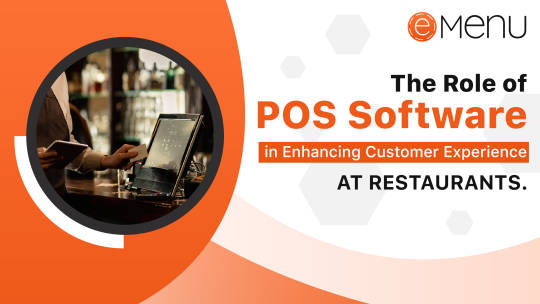
In the ever-evolving world of restaurants, providing an exceptional customer experience is crucial for success. From delectable cuisine to warm hospitality, every aspect counts. One significant factor that often goes unnoticed is the role of Point of Sale (POS) software in enhancing the overall customer experience. In this blog post, we will explore how POS software has revolutionized the restaurant industry and why it is indispensable for creating a seamless and satisfying dining experience.
Streamlined Ordering Process:
POS Software has revolutionized the way orders are taken and processed in restaurants. Gone are the days of manual order-taking, which often led to errors and delays. With the introduction of POS systems, servers can now quickly and accurately take orders directly at the table, transmitting them instantly to the kitchen. This streamlined process minimizes the chances of mistakes and ensures prompt service, allowing customers to enjoy their meals without unnecessary waiting times.
Personalized Service:
Another crucial aspect of enhancing the customer experience is personalization. OnlineEMenu POS Software enables restaurants to store detailed customer information, including preferences, dietary restrictions, and previous orders. With this data readily available, staff can provide a personalized dining experience tailored to individual tastes. From suggesting favorite dishes to accommodating special requests, the ability to remember customer preferences enhances customer satisfaction and fosters loyalty. OnlineEMenu POS Systems also facilitate effective customer relationship management by allowing targeted marketing campaigns and loyalty programs based on customer data.
Efficient Payment Options:
The payment process can often be a bottleneck in a restaurant's operations, leading to frustration for both customers and staff. POS software offers efficient payment options that simplify transactions, saving time and effort. Modern POS systems support various payment methods, including credit cards, mobile payments, and even cryptocurrencies. By offering a wide range of payment options, restaurants cater to customers' preferences and create a seamless payment experience. Additionally, integrated POS systems can split bills, apply discounts, and manage gratuities automatically, ensuring accuracy and eliminating the need for manual calculations.
Real-Time Inventory Management:
POS software goes beyond just facilitating transactions; it also plays a vital role in Inventory Management System. By keeping track of ingredient quantities and real-time sales data, restaurants can optimize their inventory levels and avoid stockouts or wastage. Efficient inventory management leads to smoother operations, ensuring that customers are not disappointed by unavailable menu items. Moreover, POS systems can generate automatic alerts when certain items reach low stock levels, enabling proactive ordering and maintaining a consistent dining experience.
Insightful Reporting and Analytics:
POS software offers valuable reporting and analytics capabilities, providing restaurant owners and managers with crucial insights into their business performance. Detailed reports on sales, customer preferences, peak hours, and more enable data-driven decision-making. These insights allow restaurants to identify trends, evaluate the success of menu items, and adjust pricing strategies accordingly. By leveraging the power of data, restaurants can continually enhance the customer experience, addressing any shortcomings and meeting evolving demands.
Conclusion:
In today's competitive restaurant industry, delivering an exceptional customer experience is essential for success. POS software has emerged as a game-changer, revolutionizing the way restaurants operate. From streamlined ordering and personalized service to efficient payments and insightful analytics, POS Systems empower restaurants to provide a seamless and satisfying dining experience. Embracing the power of technology through POS software not only enhances customer satisfaction but also improves operational efficiency, leading to increased profitability. As restaurants continue to adapt to changing consumer expectations, POS software remains an indispensable tool for delivering exceptional dining experiences.
youtube
#restaurant management software#restaurant pos system#restaurant management system#pos billing software#pos system#pos software#restaurant pos software#point of sale system#point of sale (pos) system#OnlineEMenu#point of sale#restaurant software#restaurant#restaurant billing software#restaurant point of sale#restaurant sales#restaurant ordering system#restaurant business#Youtube
5 notes
·
View notes
Text
How to Run a Restaurant Business Successfully in India: Essential Tips and Strategies
A thorough understanding of the Indian food sector, effective administration, and careful planning are all necessary for operating a successful restaurant. With the ever-increasing competition and evolving customer preferences, restaurant owners must stay ahead of the game to thrive in this dynamic market. In this article, we will explore essential tips and strategies for running a restaurant business successfully in India, with a particular focus on leveraging restaurant system management and software for efficient operations.
Embrace Technology: Restaurant Point of Sale (POS) Systems-
One of the most crucial aspects of running a successful restaurant business is adopting modern technology to streamline operations. A robust restaurant Point of sales system is an invaluable tool that can revolutionize your restaurant's efficiency and profitability. A restaurant POS system automates various tasks such as order management, inventory tracking, billing, and reporting.
Investing in reliable software for restaurant POS in India can enhance the overall dining experience for your customers. With a feature-rich POS system, you can expedite order processing, reduce errors, and improve table turnover. Furthermore, advanced POS software allows you to manage multiple aspects of your restaurant, including online orders, delivery, and reservations.
Optimize Restaurant System Management
Efficient management of your restaurant system is crucial for smooth day-to-day operations. Here are some essential tips to consider:
a) Staff Training: Invest in comprehensive training programs to ensure your staff is well-equipped to handle various responsibilities. Properly trained employees can provide better customer service, handle busy periods efficiently, and effectively utilize the restaurant POS system.
b) Inventory Management: Implement a robust inventory management system to track ingredients, supplies, and equipment. Regularly monitor stock levels, streamline procurement processes, and reduce wastage to minimize costs.
c) Menu Engineering: Analyze your menu and identify the most popular dishes, as well as the least profitable ones. Optimize your menu by highlighting high-margin items and removing underperforming dishes. This strategic approach can significantly impact your revenue and customer satisfaction.
d) Streamline Operations: Look for areas where you can automate or streamline operations further. This could include implementing self-service kiosks for order placement, online reservation systems, or integrating your POS system with third-party delivery platforms.
Focus on Customer Experience
In the highly competitive restaurant industry, providing an exceptional customer experience is paramount. Happy customers become loyal patrons and often spread positive word-of-mouth, which is invaluable for your business. Here are some tips to enhance the customer experience:
a) Personalized Service: Train your staff to provide personalized attention to customers. Encourage them to engage in friendly conversations, remember regular customers' preferences, and offer recommendations based on individual tastes.
b) Speed and Efficiency: With the help of a restaurant POS system, streamline your order management process to ensure quick and accurate service. Reduce waiting times, expedite food preparation, and optimize the billing process to leave a lasting positive impression.
c) Online Presence: Leverage the power of digital platforms to connect with your customers. Maintain an informative and user-friendly website, regularly update your social media accounts, and actively engage with customer reviews and feedback.
d) Loyalty Programs: Implement a customer loyalty program to incentivize repeat visits. Offer discounts, freebies, or exclusive benefits to encourage customers to choose your restaurant over competitors.
Maintain Quality and Consistency
Consistency is key to building a strong brand reputation and earning customer loyalty. To maintain high-quality standards:
a) Ingredients and Sourcing: Source fresh and high-quality ingredients from reliable suppliers. Ensure your kitchen staff follows strict guidelines for food preparation and storage.
b) Menu Testing: Regularly evaluate and test new dishes or menu updates to maintain consistency in taste, presentation, and portion sizes.
c) Hygiene and Cleanliness: Ensure that your restaurant maintains impeccable hygiene standards. Regularly clean and sanitize all areas, including the dining area, kitchen, restrooms, and storage spaces. Train your staff on proper food handling and safety practices to prevent any health hazards.
d) Feedback and Improvement: Encourage customer feedback and take it seriously. Address any concerns or complaints promptly and take necessary measures to rectify them. Use feedback as an opportunity for continuous improvement and to meet and exceed customer expectations.
Effective Marketing and Promotion
Implementing effective marketing and promotional strategies can help increase your restaurant's visibility and attract new customers. Consider the following tips:
a) Online Presence: Develop a strong online presence through a well-designed website, active social media profiles, and online review platforms. Regularly update your online platforms with enticing content, attractive food photography, and engaging promotions.
b) Local Partnerships: Collaborate with local influencers, food bloggers, and organizations to reach a wider audience. Offer special deals or partnerships to enhance visibility and credibility.
c) Special Events and Offers: Organize special events, themed nights, or seasonal promotions to create excitement and attract customers. Offer discounts, happy hour specials, or loyalty program incentives to entice new and repeat visitors.
d) Customer Referrals: Implement a referral program that rewards customers for bringing in new patrons. Word-of-mouth referrals can be highly effective in attracting new business.
Financial Management and Cost Control
To run a successful restaurant business, effective financial management is crucial. Consider these tips for better cost control:
a) Budgeting: Develop a comprehensive budget that includes all aspects of your restaurant's expenses, including food costs, staff salaries, rent, utilities, and marketing. Regularly review and analyze your budget to identify areas where costs can be reduced without compromising quality.
b) Menu Pricing: Set prices strategically by considering ingredient costs, competition, and customer perception. Ensure that your menu pricing allows for a healthy profit margin without alienating customers.
c) Vendor Negotiations: Build strong relationships with your suppliers and negotiate favorable terms to secure competitive pricing for ingredients and supplies. Regularly compare prices from different vendors to ensure you're getting the best deals.
d) Waste Reduction: Implement measures to minimize food waste and optimize portion sizes. Train your staff on portion control techniques and consider donating excess food to local charities or food banks.
Conclusion
Running a successful restaurant business in India requires a combination of effective management strategies, embracing technology, providing exceptional customer experiences, and implementing smart marketing techniques. By utilizing restaurant system management and leveraging pos restaurant software in India, you can streamline operations, enhance efficiency, and improve overall profitability. Additionally, focusing on customer satisfaction, maintaining quality standards, and controlling costs are essential elements of a thriving restaurant business. With dedication, continuous improvement, and the implementation of these essential tips and strategies, you can position your restaurant for success in the dynamic Indian food industry.

2 notes
·
View notes
Text











we are website development company wagzus.com, we are offering free website,logo,letter head, business card, broucher, marketing seo on just ordering of our product https://www.fiverr.com/s/QvoXoe in 5$.
#point of sale system#website design#website development#website developers#pos system#pos software#pos solutions#restaurant pos system#retail pos system#logo design#graphic design#leaflet#wordpress#wordpress themes#custom wordpress development#shopify#ecommerce#woocommerce#youtube thumbnail
5 notes
·
View notes
Text
What is the best pos system in liquor industry
Our countrywide client partnerships have assisted us in developing and transforming our Spirits sprits 2000 into the most complete and innovative software in the business. Our liquor system pos provides the advantage you'll need to thrive, with an emphasis on inventory control and precise reporting designed exclusively for retail booze establishments. Put 40 years of invention to use for you.
3 notes
·
View notes
Text
Managing Sales in Restaurants and Bars with an iPad POS System
The importance of a Point of Sale system (POS) for restaurants cannot be overemphasized. A POS system that integrates with all types of restaurants is essential due to the ever-changing technology and diners' expectations. Cloud POS, which can be used on iPads, is quickly replacing traditional server-based terminals. A restaurant iPad POS system reduces order time, increases table turnover, and improves operational efficiency.
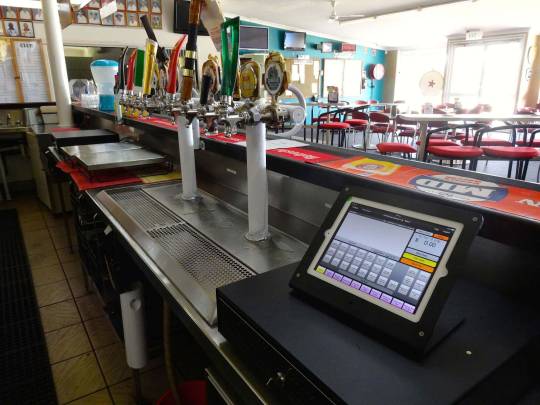
The iPad Restaurant and bar POS is better than traditional billing.
If you are still not convinced, here are some benefits of using an iPad restaurant to bill your restaurant.
1- You can save money
A business's most important factor is cost. A full-blown POS system can be physically massive, but it can also be more costly than an iPad POS from POSi IT. Traditional Point of Sale software requires heavy hardware. There is an annual maintenance fee and an installation charge. If the system crashes, all data may be lost. Additional costs can also apply for reinstallation.
The iPad POS is, however, relatively less expensive. Although there is a monthly charge, the cost is significantly lower than traditional POS systems. An Ipad is even more convenient because there are many iPad POS apps for restaurants.
2- Enhances Customer Experience
Table billing is an essential feature of POS systems. However, iPads and tablets can make billing easier due to their mobility. An iPad POS can be carried by wait staff to the table, allowing them to provide ease and, ultimately, a pleasant experience. This is an essential tool for the success of a restaurant's business.
The iPad and mobile POS systems can be used in places where a full-blown POS system cannot. They can be used as a catalogue for your restaurant, thanks to the addition of additional apps. If a customer has difficulty choosing a menu item, rather than verbally explaining the dish and then having them stare at you, your iPad POS can be used to share photos and a description of the food. iPad POS is an excellent alternative to bulky, old-fashioned POS systems.
3- It's easy to use
The star printer is small and sleek, so it can be used anywhere. These are ideal for small restaurants, kiosks, and food trucks.
Although your wait staff might not be proficient with computers, they are likely familiar with mobile devices. An iPad or tablet is easier and more convenient for your team. iPad POS system at POSisales software is easy-to-use and doesn't require technical or training.
4- No need for internet
POSiSales can be used in a restaurant setting. It is easy to use, affordable and has no ongoing fee. Customers' orders can be sent to a separate kitchen printer and bar from the POSiSales application over a local network. So you do not need to pay for the internet bills.
Conclusion
An iPad POS system for restaurants and bars can make a difference. There's a lot of hype surrounding iPads and iPhones. An iPad POS is more than just excellent. A cafe POS is helpful for small restaurants such as QSRs, food trucks/courts, and cafes.
3 notes
·
View notes
Text
The Secret Weapon of Successful Retailers: Choosing the Right POS Software
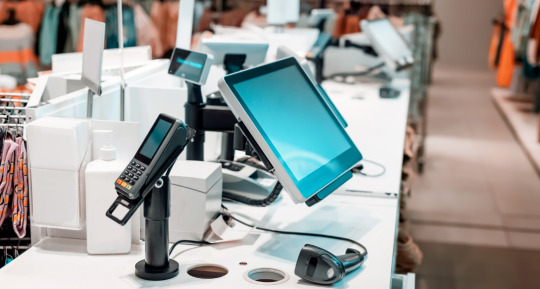
Retailers depend heavily on technology, with the retail POS system at the core of successful operations, facilitating seamless customer transactions and gathering vital sales and shopper data. Choosing the right POS solution is a critical decision, as top systems can revolutionize a retail business by boosting efficiency, growth, and profits. Retailers must opt for a POS system that can adapt to changing consumer demands, such as smooth checkout experiences, personalized shopping, and omnichannel capabilities like click-and-collect or Buy Online Return in Store (BORIS).
A retail POS system should integrate all aspects of the business, including inventory, sales, returns, and loyalty programs. Retailers in different sectors (e.g., grocery, apparel, pharmacy) operate differently, so selecting the appropriate POS solution to match business needs is crucial. The right POS system serves as a strong foundation supporting agility and growth.
Enterprise-class retail management platform
An enterprise-class retail management platform is the most effective and versatile form of POS system, providing a single, integrated, and purpose-built system centered around POS. This approach is superior to patching together various incompatible tools. Integrating all components of retail management allows for greater productivity, cost savings, and data-driven decision-making.
Three Key Considerations for Selecting a Retail POS System:
Functions: Identify all the necessary functions for managing, analyzing, or automating retail processes. Even if certain features (e.g., mobile POS) are not currently needed, choose a platform that can accommodate future requirements.
Deployment: Retail POS systems can run on in-house servers, requiring significant resources for installation, management, and upgrades. Alternatively, cloud-based software as a service offers benefits such as reduced resource requirements, no upfront investment, and up-to-date systems.
Specialist Options: Retail sectors like grocery, apparel, and hospitality have unique operational needs. Selecting a system tailored to your specific retail type can save time and money.
As technology advances, consider how easily your chosen POS system can integrate new developments such as artificial intelligence (AI) for customer service, fraud prevention, optimized inventory management, and personalization.
The advantages of selecting the right POS system include:
Efficient operations and process automation
Smart inventory management, including handling returns
Marketing and promotions that drive sales
Flexibility to adapt to changing customer demands and enhance customer experience
Comprehensive visibility into all aspects of the business and data linkage
Improved decision-making
Enhanced profitability and growth
For further guidance, refer to our POS Buying Guide eBook: The definitive guide to selecting the perfect enterprise-class retail management solution.
What about embracing new technology?
With technology evolving rapidly, it's crucial to choose a POS system that can easily integrate emerging technologies. For instance, artificial intelligence (AI) is now used by retailers for customer service, fraud detection, optimized inventory management, and personalization. To leverage these areas effectively, AI needs to analyze data and insights from the POS system, so the ability to integrate AI with the POS platform is key.
What are the advantages of choosing the right POS system?
Selecting the right POS solution offers numerous far-reaching benefits, including:
Streamlined operations through process automation
Smart inventory management, including handling returns
Targeted promotions and marketing to boost sales
Adaptability to changing customer preferences and enhanced customer experience
Clear visibility across all aspects of the business and data connectivity
Improved decision-making
Enhanced profitability and growth
1 note
·
View note
Text
Streamline Your Restaurant Operations with Eatos' POS Software
Looking for a hassle-free solution to manage your restaurant? Look no further! Eatos' POS software is here to simplify your operations and boost your efficiency.
Our user-friendly platform is tailor-made for restaurants, offering seamless integration with your existing systems. From taking orders to processing payments, our POS software does it all, making every step of the dining experience smoother for both your staff and customers.
With Eatos' POS software, you can say goodbye to manual errors and long wait times. Our intuitive interface ensures that your staff can quickly navigate through orders, while our real-time analytics give you valuable insights into your business performance.
Whether you're a small cafe or a bustling eatery, our POS software is designed to scale with your business needs. Plus, with 24/7 support, you can trust that we'll be there whenever you need us.
Experience the power of Eatos' POS software and take your restaurant to new heights of success. Visit our website here to learn more and get started today!
#restaurant business#restaurant technology#restaurant management system#restaurant point of sale#restaurant pos system#restaurant pos software#restaurant management software
0 notes
Text
Restaurant POS Software Solution - Pratham POS
Pratham POS provides innovative cafe and restaurant POS solutions tailored to dynamic needs. With capabilities ranging from detailed inventory tracking to efficient order management, Pratham POS helps enhance customer satisfaction and drive business growth. Ideal for various setups like fine dining, fast food, or coffee shops, each feature is crafted to meet specific operational demands. Ready to revolutionize your service? Call us at 1300 941 886.
#pos software#pos solutions#restaurant pos system#pos system#Cafe POS#point of sale system#australia#melbourne
0 notes
Text
Quality Merchant Services offers state-of-the-art point of sale systems Fort Myers FL, and beyond. With features like inventory management, real-time reporting, and integrated payment processing, our POS solutions are designed to enhance efficiency and productivity. Say goodbye to manual tasks and hello to streamlined operations with our cutting-edge systems.
Quality Merchant Services
13180 North Cleveland Avenue Ste 117, North Fort Myers, FL 33903
(239) 271–1168
My Official Website: https://cobrapos.com/
Google Plus Listing: https://www.google.com/maps?cid=8080693164650784808
Service We Offer:
pos system
credit card processing
restaurant pos systems
point of sale systems
pos software
bar pos system
Follow Us On:
Twitter: https://twitter.com/services30102
Pinterest: https://www.pinterest.com/QualityMerchantServices/
Instagram: https://www.instagram.com/qualitymerchantservice/
#point of sale systems fort myers fl#point of sale systems lee county fl#pos software fort myers fl#point of sale software fort myers fl#restaurant software fort myers fl#pos systems lehigh acres fl
0 notes
Text

KPIs provide insights into various aspects of your business, helping you identify strengths, weaknesses, and opportunities for improvement. Discover the top 10 KPIs retail stores should track for success.
Learn how robust POS software enhances tracking and decision-making. Read more! https://www.idzlink.com/blog/key-performance-indicators-retail-stores-should-track/
#pos#cloud pos#pos system#point of sale#retail pos#pos software#retail pos system#idzlink pos#inventory management software#KPI calculation
0 notes
Text
How Restaurant Management Software Streamlines Operations and Boosts Efficiency
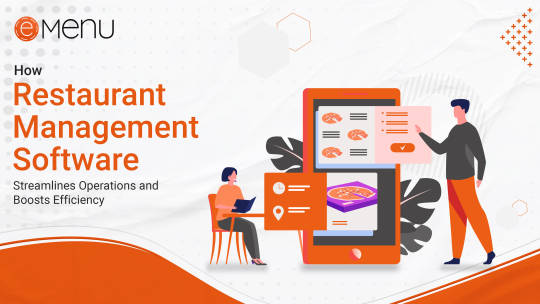
The restaurant industry is highly competitive, and efficient operations play a crucial role in the success of any establishment. In today's digital age, restaurant management software has emerged as a powerful tool to streamline operations and boost efficiency. This blog post explores the various ways in which restaurant management software revolutionizes the way restaurants operate, enabling them to deliver exceptional customer experiences while optimizing their backend processes.
The Role of Restaurant Management Software:
Online eMenu Restaurant management software is a comprehensive solution designed to handle the diverse aspects of running a restaurant. It encompasses a wide range of features and functionalities that simplify day-to-day operations, enhance productivity, and improve overall efficiency. From Restaurant tasks to Restaurant operations, the software offers a centralized platform to manage and streamline various processes.
Streamlining Restaurant Operations:
In the bustling environment of a restaurant, managing Restaurant operations efficiently is essential. Online eMenu Restaurant management software offers tools for reservation and table management software, allowing customers to book tables online and providing staff with real-time updates on reservations. This helps optimize table turnover and maximize seating capacity, leading to better customer service and increased revenue. Additionally, the software integrates with the point-of-sale (POS) system, enabling seamless order taking and processing.
Enhancing Restaurant Efficiency:
Efficiency in the Restaurant operations is equally important for smooth restaurant functioning. With restaurant management software, staff scheduling and labor management become hassle-free. The software automates scheduling, taking into account factors such as staff availability and workload, resulting in optimized staff allocation and improved productivity. It also tracks labor costs and performance metrics, providing valuable insights for effective decision-making.
Supplier and procurement management is another critical aspect that software addresses. By streamlining the ordering process and managing suppliers, restaurants can ensure timely and accurate deliveries. The software facilitates inventory forecasting, minimizing wastage and optimizing stock levels. Real-time reporting and analytics capabilities empower restaurant owners and managers to monitor sales, expenses, and performance, enabling data-driven decision-making.
Customer Relationship Management (CRM):
Building strong customer relationships is vital for the success of any restaurant. Restaurant management software Customer Relationship Management (CRM) helps in creating and maintaining customer profiles, capturing preferences, and analyzing data to deliver personalized experiences. Additionally, the software facilitates the implementation of loyalty programs and targeted marketing campaigns, allowing restaurants to engage with customers effectively and increase customer retention.
Ensuring Data Security and Accessibility:
Data security is a paramount concern in today's digital landscape. Restaurant management software offers robust security measures to protect sensitive customer information and business data. Cloud-based solutions provide data backup and ensure accessibility from anywhere, anytime, allowing owners and managers to monitor and manage their restaurant's operations remotely. User access control features further enhance data privacy and confidentiality.
Case Studies: Success Stories of Restaurant Management Software Implementation
Real-life examples of restaurants that have implemented restaurant management software can provide valuable insights into its effectiveness. Case studies highlighting specific improvements and outcomes achieved through the software demonstrate how it has helped restaurants streamline their operations, enhance efficiency, and deliver exceptional dining experiences.
Challenges and Considerations:
While restaurant management software offers numerous benefits, it's essential to consider potential challenges and factors when selecting the right software. Factors such as cost, scalability, user-friendliness, and integration capabilities with existing systems should be evaluated before making a decision. Addressing these considerations ensures a successful implementation and maximizes the software's potential.
Conclusion:
Restaurant Management software has become a game-changer in the industry, revolutionizing the way restaurants operate. By streamlining operations, enhancing efficiency, and optimizing processes, this software empowers restaurants to deliver exceptional customer experiences while driving profitability. As technology continues to shape the future of the restaurant industry, embracing restaurant management software becomes essential for those seeking.
#restaurant management software#contactless menu system#qr code#restaurant management system#restaurant pos system#contactless menu#contactless qr code menu#contactless ordering app#point-of-sale (POS) system#point-of-sale system#pos billing software#restaurant pos software#pos system#pos software#restaurant software#restaurant sales#restaurant#qrcodemenu#qr code menu#cloud based pos billing system#cloud based pos billing software#crm software#crmintegration#restaurant crm#restaurant crm software#crm development#online food ordering software#online food ordering system#food ordering system online#Restaurant Table Booking
4 notes
·
View notes
Text
Explore Latest Trends in Retail Point-of-Sale (POS) Software
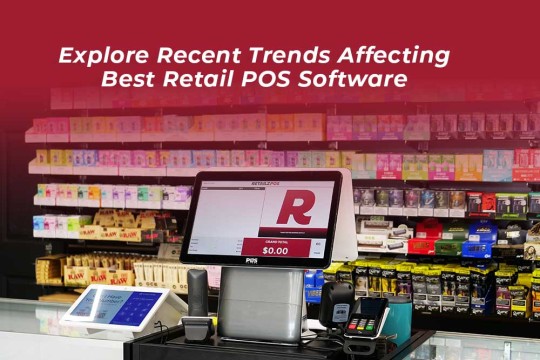
Explore Latest Trends in Retail Point-of-Sale (POS) Software
Retail POS systems have shifted from just processing transactions to becoming the actual pillar of modern operations in fast-paced retail operations. The retail Point of Sale (POS) software market is evolving alongside technological advancements. Retailers, nowadays, are looking for ways to run their businesses more efficiently by leveraging data intelligence. This blog will discuss seven current trends shaping the fast-paced retail POS software industry. This blog will help discover how business owners can track transactions, inventory, and customer data from Cloud computing-based systems to mobile integrations and advanced analytics. These trends are the essence of POS software that has turned the retail experience into something unique. This report provides a blueprint of the changing retail landscape, which businesses can use to make sound decisions when continuing to dominate this competitive market.
Cloud-Based POS Systems
The revolution in the retail industry is thanks to cloud-based POS systems providing unmatched skillfulness, scalability, and accessibility that permit businesses to operate from any place. With several advantages, cloud computing POS systems offer convenience and assist in updating software, increasing data security, and giving instant analytics. These systems are helpful for small and medium-sized businesses that use POS systems equipped with more advanced functionality for expensive on-site systems. Similarly, they set the stage for a smooth application interoperability that eventually leads to a complete solution for retail.
Mobile POS (mPOS) Integration
The perfect combination of mobile devices with mPOS (Mobile POS) systems has opened up an era beyond the traditional checkout limitations. The workforce can conveniently handle transactions, track inventory levels, and uninterruptedly communicate with customers with the latest tablets and smartphones. Improving purchase speed and employee assistance on the shop floor increases customer satisfaction. The retail POS software market is fast to integrate with mPOS integration, resulting in increasing demand for simple and intuitive in-store operations. Besides, mobile-based POS systems help CRM by capturing crucial data on purchase behavior and requirements of customers.
Contactless Payments and Digital Wallets
The demand for contactless payments and digital wallets has emerged because of their embedded safety and security features. Retail point of service (POS) systems are revolutionizing to embrace a variety of payments, with NFC and scannable QR codes being some examples. Retailers have to integrate their POS system with digital wallets to cope with the demands and requirements of consumers. Adopting contactless payments helps the transaction process smoother, and retail outlets stand out in the modern payment arena. The fact that contactless payment instruments remove the necessity of personal interaction and contribute to safety in the stores.
Data Analytics For Informed Decision-Making
Data-driven decision-making is the key to achievement of success in modern retail business. It is the POS systems that provide decision-makers with these findings. Innovative retail POS software combines complex analytical tools that unveil new aspects of customer behavior, inventory, and sales trends. With access to such information, retailers can enhance their pricing strategies, improve inventory planning, and provide customized customer experiences. With access to such information, retailers can enhance their pricing strategies, improve inventory planning, and provide customized customer experiences. It is worth noting that data analytics has become an essential aspect of POS systems. It indicates that the industry is now emphasizing critical thinking and decision-making skills. By leveraging accurate forecasting tools, businesses can determine the optimal time to sell their goods and services, resulting in greater profitability.
Omnichannel Integration
The boundaries between online and offline retail need to be clarified, requiring POS software to support seamless omnichannel experiences. Retailers enjoy POS — Point of Sale System in their retail stores that integrate faster with e-commerce platforms, enabling common inventory control, order fulfillment, and data management from any channel. This integration supports the omnichannel strategy, which develops customer loyalty and assists retailers to optimize their operations. Furthermore, integrated omnichannel strengthens marketing activities by providing the opportunity for targeted promotions and recommendations of offerings tailored to customer interests and previous purchases.
Enhanced Security Features
Securing Point of Sale (POS) systems has become crucial for retail businesses due to the increasing prevalence of cyber threats. The introduction of advanced security features such as end-to-end encryption, tokenization, and biometric authentication in POS software provides reliable protection for sensitive customer and transaction data. The Payment Card Industry Data Security Standard (PCI DSS) compliance is part of the security controls put in place. Addressing concerns about data theft is key to maintaining customer trust during this global phenomenon. Also, the additional security arrangements inspire their confidence in consumers, and they remain loyal to the brand for a long time.
Subscription-Based Pricing Models
The retail industry’s point-of-sale software management is transforming subscription-based pricing. The subscription model provides retailers with high flexibility, scalability, and cost predictability. The shift in this trend allows the SaaS community to install new software updates, elements, and support capabilities without down payments. Subscription-based pricing enables businesses to scale POS systems according to their growth. Additionally, subscription programs establish customer loyalty by providing continuous technical support and product upgrades that guarantee a hassle-free and enjoyable experience.
Conclusion:
The retail industry is undergoing significant transformations, all thanks to the advancement of technology. This technological revolution is changing buyers’ expectations, and retailers are ready to adapt to these changes in various ways. One of the emerging trends in the retail point-of-sale software industry is the adoption of cloud-based POS solutions, which offer improved security features and subscription-based pricing models. These trends signify a new way of managing businesses for retailers and a change in how they interact with their customers. By embracing these trends, businesses provide better customer service, attract new customers, and develop innovative solutions that cater to the requirements of consumers. Since the retail industry is evolving, companies must keep up with the latest trends and technologies, such as retail POS software, to improve sales and foster innovation. By embracing innovation and staying ahead of the curve, retailers can successfully navigate the digital era and a constantly changing world.
#retail pos software#retail pos system#mobile pos system#cloud-pos-solution#point of sale system#pos-software-solution#pos-system-solution#cloud-based-pos-solution#smoke-shop-pos#liquor-store-pos#cbd-store-pos#smok-shop-pos
0 notes
Text
Full-Service POS Systems and Increased Sales Success
Point of Sale (POS) systems are becoming essential tools for companies of all sizes in the fast-paced business world of today, completely changing the way transactions are carried out and handled. One of the many advantages of integrating full-service point-of-sale (POS) systems is the possibility of higher sales success. Let's examine the specifics of how these systems act as a business's revenue link.
Optimized Processes to Increase Productivity
A full-service point-of-sale (POS) system's ability to streamline processes and improve overall business efficiency is one of its main benefits. These systems do away with the necessity for numerous independent systems by combining different tasks including customer relationship management, inventory control, and sales processing into a single platform. Businesses can eliminate errors, cut down on redundancies, and improve processes by centralizing activities, which will ultimately save time and money.
Additionally, user-friendly features and intuitive interfaces are frequently included in full-service point-of-sale (POS) systems, which further enhances efficiency. Workers have easy access to relevant information, can conduct transactions quickly, and can swiftly browse menus. In addition to speeding up transaction times, this smooth experience increases overall productivity, freeing up staff members to concentrate on providing outstanding customer service and increasing sales.
Instantaneous Knowledge for Well-informed Decision Making
Decision-making that is successful depends on having timely and reliable facts available. Businesses can make educated decisions quickly with the help of full-service point-of-sale (POS) systems, which provide them access to real-time data on sales patterns, inventory levels, and consumer behavior. Provided that stakeholders have access to extensive information and analytics tools, they can spot chances for focused marketing campaigns, upselling, and cross-selling. Businesses can take advantage of market dynamics and optimize revenue potential by utilizing this information.
Moreover, full-service point-of-sale (POS) systems frequently link with other company tools and platforms, including e-commerce platforms, CRM systems, and accounting software, facilitating easy data sharing and analysis. Businesses may have a comprehensive understanding of their operations and consumer interactions thanks to this interconnected ecosystem, which enables more insightful and strategic decision-making.
Integrated Systems Working Together to Improve Customer Experience
In the current competitive environment, success is largely dependent on providing outstanding client experiences. Full-service point-of-sale (POS) systems enable organizations to offer a consistent and tailored consumer experience by facilitating seamless integration across many touchpoints. These systems make every customer interaction seamless, effective, and memorable, whether it's through integrated payment solutions, omnichannel sales capabilities, or loyalty program management. Businesses may improve sales revenue, promote brand loyalty, and drive repeat business by cultivating closer ties with their customers.
Strong Security Protocols for Mindfulness
Security is a primary concern for companies that operate in the digital sphere due to the increase in cyber threats and data breaches. Robust security measures are incorporated into full-service point-of-sale (POS) systems to protect confidential data and prevent unwanted access. These systems use several levels of defense, ranging from tokenization strategies and encryption algorithms to PCI compliance requirements, to reduce risks and guarantee data integrity. Businesses can boost credibility and trust with customers by giving them assurance about the security of their transactions. This will improve sales and promote long-term growth.
Scalability for Continuing Development and Growth
Scalability is becoming an increasingly important component of corporate success as they grow and change. Full-service point-of-sale (POS) systems are engineered to expand alongside the business, providing flexibility and scalability to meet evolving demands. These systems can seamlessly adjust to changing company environments by integrating third-party apps, adding new locations, or increasing product lines. Businesses may future-proof their operations, take advantage of new opportunities, and maintain long-term development and profitability by offering a scalable infrastructure.
In summary
In conclusion, full-service point-of-sale (POS) systems act as the link between businesses and revenue by optimizing processes, offering in-the-moment information, augmenting client experiences, guaranteeing strong security, and permitting scalability for future expansion. Businesses may maximize sales success, spur revenue development, and maintain an advantage over competitors in today's fast-paced marketplace by utilizing the power of these platforms.
0 notes